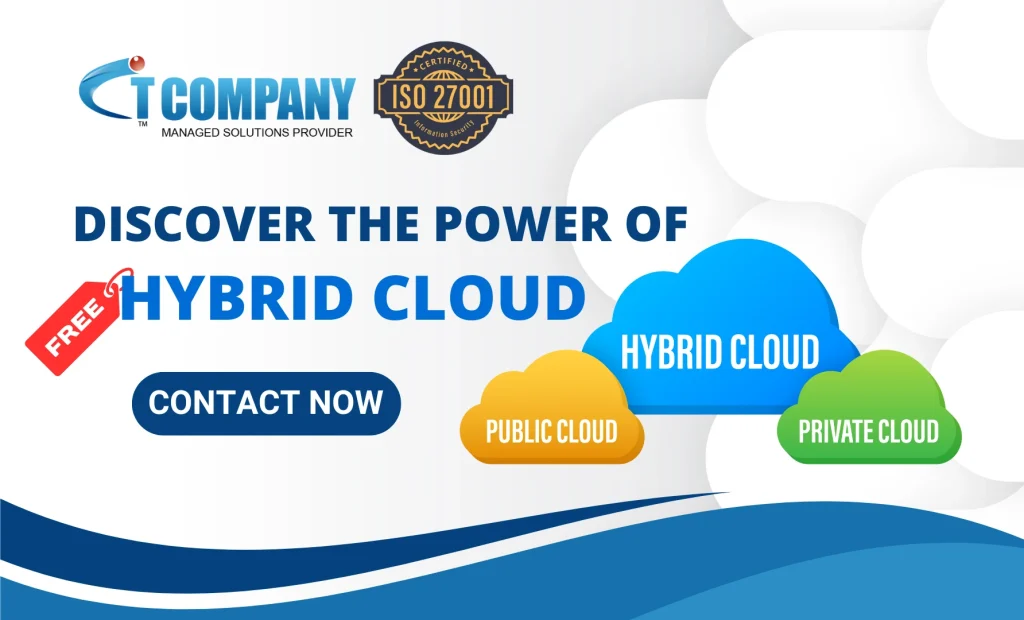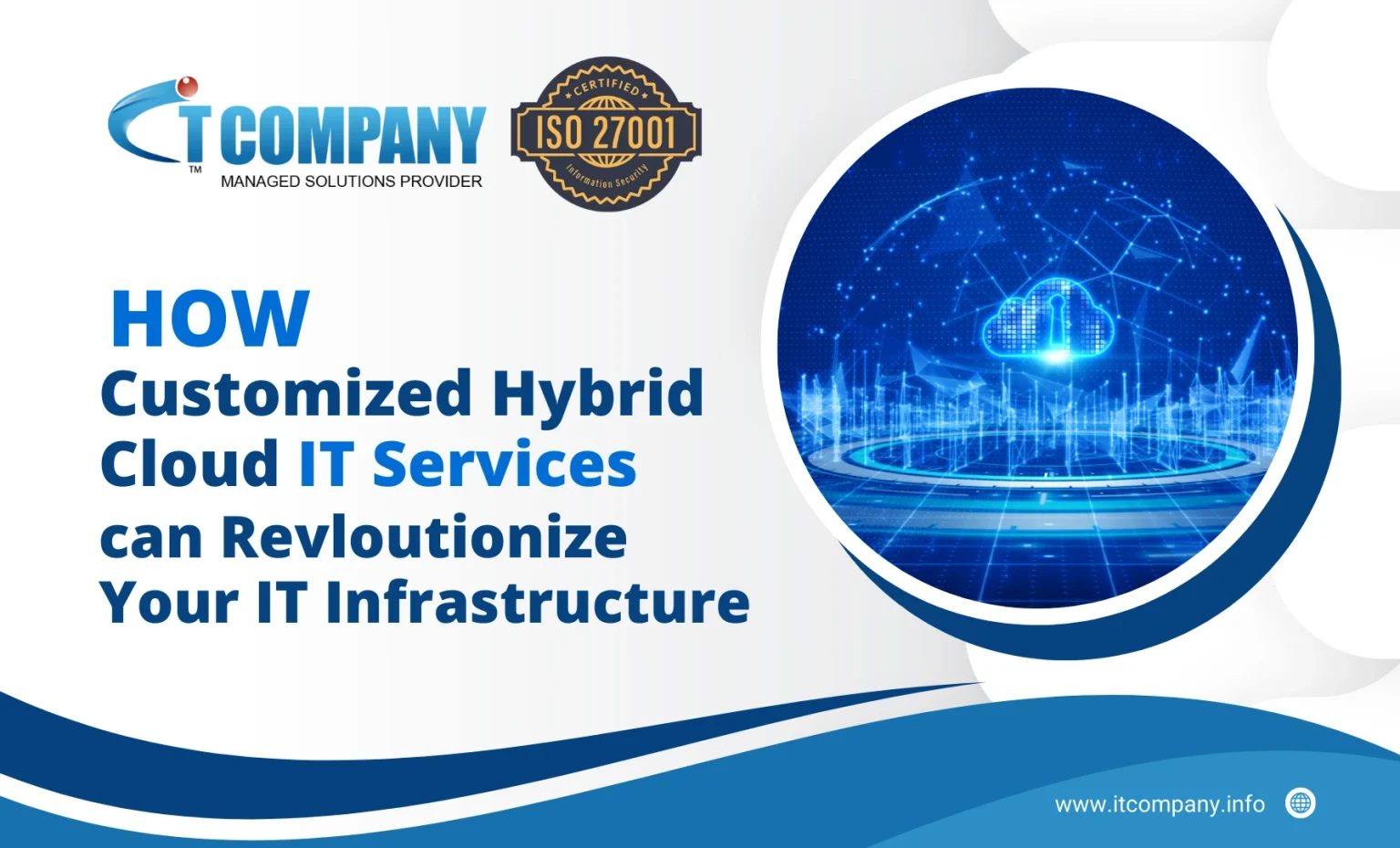.
In 2023, the global hybrid cloud market was valued at over $84 billion and is projected to grow at a compound annual growth rate (CAGR) of 18.3% through 2030. This surge in demand reflects a major shift in how businesses are approaching their IT infrastructure. As companies look to stay competitive, the need for Customized Hybrid Cloud IT Services in {{ CITY1 }}, {{ CITY2 }} and {{ CITY3 }} has never been greater.
These solutions allow organizations to tailor their infrastructure to meet specific business needs, combining the best of both public and private cloud environments. While some businesses still rely on cloud services, the demand for secure, scalable, and flexible solutions is driving many towards providers that are ISO 27001 certified, ensuring robust data protection and compliance.
In this blog, we’ll explore how adopting a hybrid cloud approach can transform your IT operations, enhance security, and drive cost savings while meeting modern business demands.
Common Problems in Traditional IT Infrastructure
- Scalability Issues One of the major challenges for businesses is ensuring their IT infrastructure can scale quickly and efficiently. As organizations grow, so do their data and computing needs. Traditional IT setups, relying heavily on on-premise servers and hardware, struggle to scale fast enough to keep up with changing demands. This can result in sluggish performance, system outages, and an inability to meet customer expectations.
- High Costs Maintaining an in-house IT infrastructure can be expensive. The costs of purchasing, installing, and maintaining hardware, as well as paying for IT personnel to manage it all, can quickly add up. Additionally, many businesses end up over-investing in infrastructure to accommodate potential future growth, resulting in underutilized resources that waste money.
- Security Concerns With growing threats from cyberattacks and data breaches, businesses need to ensure their IT systems are secure. Managing security on-premises can be complex and costly. Organizations often struggle to implement comprehensive security measures that cover both hardware and software components of their infrastructure. Furthermore, sensitive data stored on local servers can be vulnerable if not properly protected.
- Data Management Challenges As data grows exponentially, businesses face difficulties managing and analyzing it effectively. Storing large amounts of data on traditional servers often leads to bottlenecks and inefficiencies. Additionally, the inability to access data in real time can hinder decision-making and slow down business operations.
- Lack of Flexibility Traditional IT infrastructure is often rigid. Businesses may find it difficult to adapt their systems to meet new demands or implement new technologies. This lack of flexibility can slow innovation and hinder a company’s ability to stay competitive in a rapidly changing marketplace.
Customized Hybrid Cloud IT Services & Problems Fixation
Customized hybrid cloud IT services offer a solution to many of the challenges faced by modern businesses. By combining the benefits of both public and private clouds, hybrid solutions allow businesses to tailor their infrastructure to meet specific needs while reaping the advantages of cloud technology.
1. Scalability
One of the greatest advantages of hybrid cloud services is scalability. With a hybrid cloud, businesses can easily scale their IT infrastructure to meet growing demands. They can use public cloud resources for flexible scaling when needed, while retaining sensitive data on private cloud servers for more control. This dynamic approach ensures that businesses are always prepared for peak workloads without investing in unnecessary on-premise hardware.
Example: A retail company can use the private cloud to store and protect customer data and financial records, while utilizing public cloud resources to handle high traffic during seasonal sales events. This enables them to maintain performance without overburdening their internal infrastructure.
2. Cost-Effectiveness
By adopting a hybrid cloud, businesses can significantly reduce costs associated with maintaining an on-premise IT infrastructure. Instead of purchasing expensive hardware and managing it in-house, businesses can leverage public cloud services to reduce capital expenditures. The pay-as-you-go model of public cloud providers ensures that companies only pay for the resources they use, optimizing cost efficiency.
Example: A software company can store its development and testing environments in the public cloud, minimizing the need for additional servers and reducing hardware costs.
3. Enhanced Security
While cloud computing is often seen as a security risk, hybrid cloud IT services allow businesses to retain full control over their sensitive data by storing it in private cloud environments. Public clouds provide strong security protocols as well, but businesses have the flexibility to decide what data is kept where. Advanced encryption, multi-factor authentication, and other security measures ensure that data is protected at all levels.
Example: A healthcare organization can store patient records and medical data in a private cloud for enhanced security, while utilizing a public cloud for non-sensitive applications like email or collaboration tools.
4. Improved Data Management
Hybrid clouds also offer better data management. Organizations can store large amounts of data in the public cloud and leverage advanced analytics tools to gain insights in real time. With integrated systems, businesses can access data from different sources seamlessly, enabling faster decision-making and smoother operations.
Example: A financial institution can use hybrid cloud IT services to store transactional data securely on a private cloud while analyzing market data and trends in real time using public cloud resources.
5. Increased Flexibility
Hybrid clouds offer businesses the flexibility to adapt to changing needs and technologies. They can quickly deploy new applications, adjust to fluctuations in traffic, and test innovative solutions without being tied to a rigid infrastructure. This flexibility promotes faster growth, innovation, and competitive advantage.
Example: A tech startup can use the hybrid cloud model to rapidly develop, test, and deploy new software while keeping critical business data secure in a private cloud.
Benefits of Customized Hybrid Cloud IT Services
| Benefit | Description |
|---|---|
| Flexibility | Allows businesses to choose which data and applications are stored in private and public clouds. |
| Scalability | Easily scale resources to meet business demands without investing in costly hardware. |
| Cost Savings | Pay-as-you-go model reduces the need for capital investments in infrastructure. |
| Enhanced Security | Sensitive data is securely stored on private clouds while benefiting from the public cloud’s security. |
| Improved Performance | Utilize public cloud resources for high-demand periods without overloading internal systems. |
| Innovation & Agility | Quickly adapt to market changes and test new technologies without the constraints of traditional IT. |
| Better Data Management | Manage large amounts of data more effectively and gain real-time insights through cloud-based analytics. |
Conclusion
Customized hybrid cloud IT services have the potential to revolutionize the way businesses manage their IT infrastructure. By addressing key challenges such as scalability, cost, security, data management, and flexibility, hybrid clouds offer a tailored solution that meets the unique needs of each organization. With these services, businesses can stay ahead of the competition, improve operational efficiency, and focus on innovation rather than being bogged down by traditional IT limitations.

Adopting a hybrid cloud strategy is not just about keeping up with the latest technology trends—it’s about transforming your infrastructure to be more agile, cost-effective, and secure, ensuring long-term success in an ever-evolving digital landscape.
Frequently Asked Questions
1. What is the difference between a public cloud, private cloud, and hybrid cloud?
2. How secure is my data when using hybrid cloud IT services?
3. What should I do if I face issues during the installation of hybrid cloud services?
4. How often do I need to update my hybrid cloud system?
5. Can I switch between public and private clouds easily in a hybrid cloud setup?

